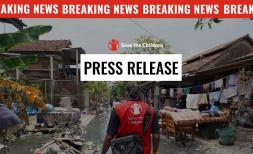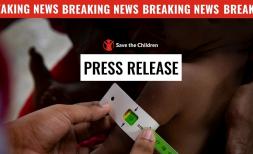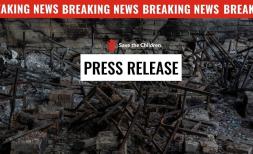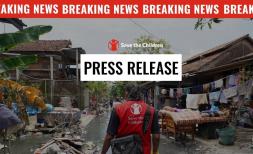Children in urgent need of life-saving support as Cyclone Gombe batters southeast Africa
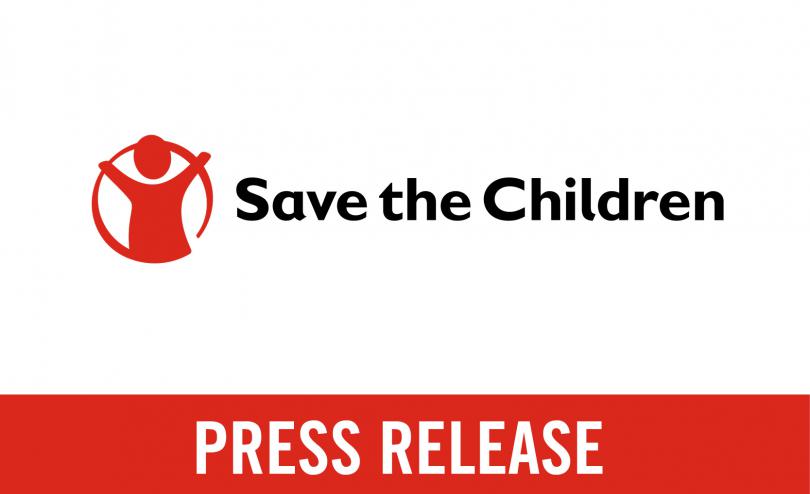
LILONGWE, 18 March – Children and families in south-east Africa are facing an escalating humanitarian crisis following Cyclone Gombe, which battered the region earlier this week, Save the Children said today.
Some 41,000 people have been forced from their homes across Malawi and Mozambique, the organisation said.
In Mozambique, the storm killed at least 53 people and forced nearly 21,000 from their homes across two provinces, while in Malawi at least seven people are reported dead and more than 20,000[i] have lost their homes. The storm has affected nearly 500,000[ii] people, including more than 250,000 children, across both countries: destroying homes, killing livestock, and destroying crucial infrastructure such as roads and bridges. In Mozambique, at least 307 schools have been destroyed, threatening to further disrupt children’s education.
The storm also hit Madagascar, but the island state – which last month endured four tropical storms in five weeks – was spared major damage, Save the Children said.
Tropical cyclone Gombe arrived just as communities were starting to recover from the devasting impact of Storm Ana which struck in late January, forcing more than 240,000 people from their homes across all three countries[iii], and killing 130[iv].
Joan* 14, from Malawi, lost her home to Cyclone Gombe. She said: “We need a proper house as the one we were staying in with my grandmother collapsed in the rainstorm. I went to stay with her as she was staying alone and she needed support. But the rains have now separated us. I am now staying with my mother and that means my grandmother is not getting adequate support. I used to fetch water for her and wash and clean the house. I am so anxious about her well-being.
“Our food and even crops have been washed away. It is difficult to attend school on an empty stomach.
“I need support with my education. My books, school bag, some of my clothes, and the only pair of shoes I had were washed away. I am not going to school in the meantime.”
Save the Children is concerned that southern Africa and the Indian Ocean has entered a destructive cyclone season, with multiple storms already hitting Malawi and neighboring countries this year. These extreme weather events are more frequent and severe due to the climate emergency, the organisation said.
Save the Children’s Country Director in Malawi, Kim Koch, said: “These recurrent storms are threatening children's survival and well-being and the need to act is greater now than it has ever been. As Save the Children, we will do whatever it takes to ensure children survive, are protected and that they continue to learn.
“The storms are also threatening to undo decades of progress and have ushered a new urgency to invest in education, protection and healthcare systems.
“Several studies have suggested that climate change will increase the intensity of storms. It is critical for national and world leaders to urgently address the issue of climate change. Change is possible and a better world for children can be built, but we have to act now.”
Save the Children’s Country Director in Mozambique, Brechtje Vanlith, said: “The floods from Cyclone Gombe washed away livestock, houses and property, and cut off crucial roads, hampering the delivery of aid and making search and rescue operations difficult. Children and families need shelter, food, clothing, dignity packs, medical and school supplies. We know of 691 classrooms that have been destroyed, affecting 75,607 students. We expect to find more damage in the next days and weeks, as some areas are still completely inaccessible due to flooding.
“Governments and NGOs must prioritize a response that involves the local community to prevent further displacement and worsening of the humanitarian crisis.”
“Save the Children is already responding to the impact caused by Storm Ana and has reached over 30,000 children and their families through cash transfers, health outreach services, child protection and hygiene materials. In response to Cyclone Gombe, Save the Children is preparing to reach communities in Malawi and Mozambique including those who have been doubly impacted by the two storms.”
ENDS
Notes to editors
Save the Children works in 25 of 28 districts in Malawi, delivering programmes, advocating for children’s rights and building capacity to respond to emergencies.
Save the Children has been working in Mozambique since 1986, implementing development programmes in partnership with provincial and district governments and national and international civil society organisations.
Save the Children has been working in Madagascar since 2016, specializing in cash-based and protection assistance.
[i] According to government data
[ii] According to government data from Malawi and Mozambique
[iii] In Madagascar, Storm Ana caused flooding, landslides, deaths of 55 people, and forced 38,862 people from their homes, according to government figures. In Malawi, it swept across 20 districts, claiming 46 lives, and impacting over 950,000 people including 500,000 children. More than 190,429 were people displaced. Similar devastation was reported in Mozambique with at least 29 people losing their lives to Tropical Storm Ana and 10,814 being uprooted from their homes. Total displaced across three countries = 240,105.
[iv] According to government data, in Madagascar, Storm Ana killed 55 people, in Malawi it killed 46 people and in Mozambique it killed 29 people.
For more information please contact:
Emily Wight, Emily.Wight@savethechildren.org;
Delfhin Mugo, Delfhin.Mugo@savethechildren.org;
Out of hours (GMT), media@savethechildren.org.uk / +44(0)7831 650409

